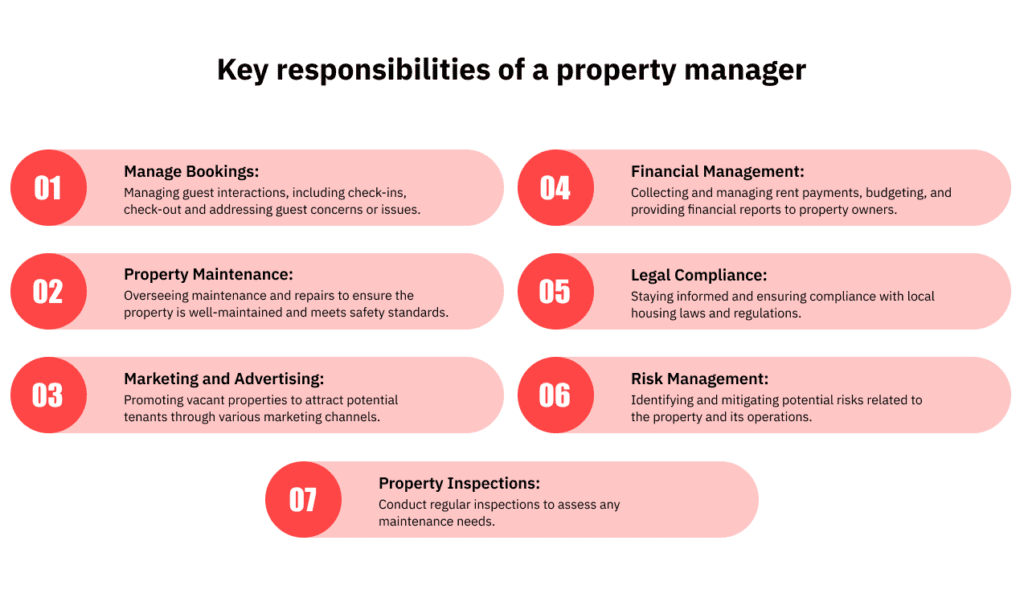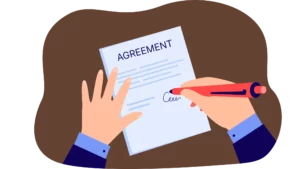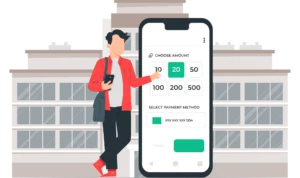If you’re a vacation rental host, you may have considered the services of a property manager. But what exactly does a property manager do, and is it worth having one for your real estate investments? In this comprehensive guide, we’ll delve into the roles and responsibilities of a property manager to help you decide if hiring one is the right move for you.
Who is a Property Manager?
A property manager is a professional responsible for the day-to-day operations and oversight of real estate properties on behalf of the vacation rental owner. Their primary goal is to ensure the property’s effective management, maximize its value, and meet the needs of both property owners and tenants. The role of a property manager can vary based on the type of property they are managing, including residential, commercial, or vacation rentals.
Bonus Read: Property Management tasks that can be automated
What does a Property Manager do?
A property manager serves as the bridge between property owners and vacation rental guests. They handle various aspects of property management, ensuring a seamless and profitable experience for property owners.
Let’s explore the key responsibilities of a property manager:


1. Getting and Managing Bookings
Property managers actively market vacant properties to attract potential guests. They leverage online booking platforms, local advertising, and their network to find guests and maximize bookings. Once they get bookings, it’s their responsibility to communicate with them throughout the check-in process and ensure their stay goes well. They are also responsible for getting more Airbnb reviews for your vacation rental property.
2. Rent Collection and Financial Management
Property managers ensure the collection of nightly charges from the guests. They ensure that your property doesn’t have Airbnb squatters. Property managers also manage property finances, including budgeting, expense tracking, and providing regular financial reports to property owners. They also take care of your Airbnb pricing strategy and your dynamic pricing needs.
3. Property Maintenance and Repairs
Property managers oversee property maintenance and address repair issues promptly. They schedule routine inspections, coordinate repairs, and work with reliable contractors. Property managers take swift action in emergencies like storm damage to ensure the property is safe and habitable.
4. Legal Compliance and Risk Management
Property managers stay updated on local short-term rental restrictions. They ensure that the property complies with legal requirements, such as safety codes and zoning laws. Property managers act as liaisons in case of disputes or legal issues, mitigating risks and ensuring legal compliance.
5. Guest Relations and Conflict Resolution
Property managers act as mediators in case of conflicts with the guests, addressing issues diplomatically. They foster positive tenant relations, ensuring a harmonious living environment. Property managers contribute to guest satisfaction and retention by providing a responsive and approachable presence.
Bonus Read: 15 Airbnb Hosting Tips To Make Your Listing Successful
Do You Need a Property Manager?
Now that we’ve explored the various roles of a property manager, let’s evaluate whether you need one for your real estate investments.
Limited Time:
A property manager can alleviate the workload if you have a busy schedule and lack the time to handle day-to-day vacation rental management tasks.
Multiple Properties:
Managing multiple properties can be overwhelming. A professional streamlines operations, ensuring each vacation rental receives proper attention.
Geographic Distance:
If your properties are located far from your residence, having a local property manager ensures on-site management and quick response to issues.
Legal Complexities:
Navigating local housing laws and regulations can be complex. A property manager with legal knowledge ensures compliance and reduces legal risks.
Limited Expertise:
If you lack expertise in areas like guest screening, rent collection, vacation rental maintenance, or dynamic pricing, a manager brings professional knowledge to the table.
Bonus Read: How vacation rental owners are using PriceLabs Market Dashboard?
Hands-On Approach:
Self-management might be viable if you enjoy being hands-on with your properties and have the time and expertise. If not, then hiring a manager for your property will be your best bet.
Single Property Ownership:
Self-management may be practical if you own a single property and can handle the responsibilities without feeling overwhelmed.
Cost Considerations:
If budget constraints are a concern, and you have the capacity to manage efficiently, self-management can save on property management fees.
Conclusion
In the dynamic world of real estate, hiring a property manager depends on your circumstances, preferences, and resources. Understanding the roles and responsibilities outlined in this guide should empower you to make an informed choice that aligns with your goals as a property owner. Whether you opt for professional management or self-manage, the key is ensuring your real estate investments’ optimal performance and profitability.
About PriceLabs
PriceLabs is a revenue management solution for the short-term rental and hospitality industry, founded in 2014 and headquartered in Chicago, IL. Our platform helps individual hosts and hospitality professionals optimize their pricing and revenue management, adapting to changing market trends and occupancy levels.
With dynamic pricing, automation rules, and customizations, we manage pricing and minimum-stay restrictions for any portfolio size, with prices automatically uploaded to preferred channels such as Airbnb, Vrbo, and 100+ property management systems and channel integrations.
Every day, we price over 300,000+ listings globally across 135+ countries, offering world-class tools like the Base Price Help and Minimum Stay Recommendation Engine. Choose PriceLabs to increase revenue and streamline pricing and revenue management. Sign up for a free trial at pricelabs.co today.









